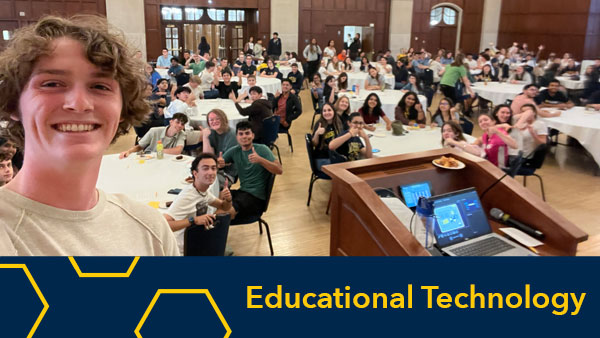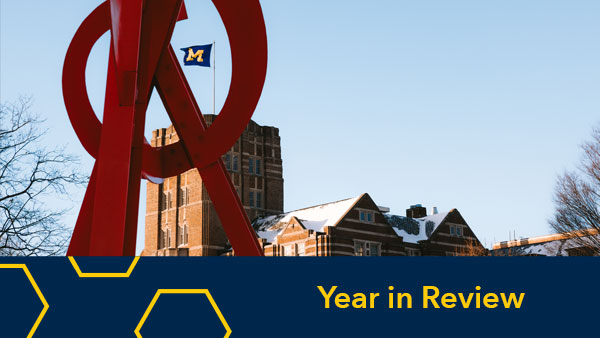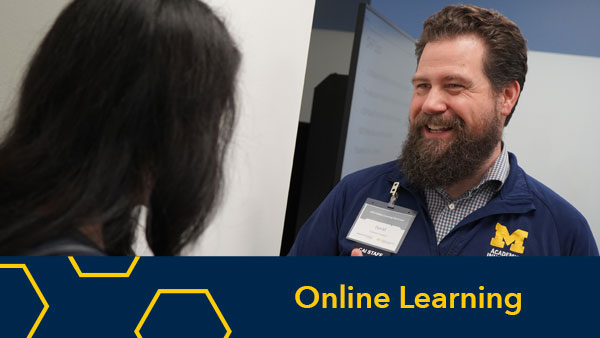Cait Hayward, Associate Director for Research and Development
One year ago, we launched the Academic Innovation Data Showcase – an event where we take time to reflect on the opportunities and challenges of the data at the heart of our initiatives and learn about what our colleagues are working on. We’re again hosting this event on February 14, Valentine’s Day, and we hope you’ll join us for candy, valentines, and an exciting lineup of speakers from across U-M. Just hearing about this and want to join us? There are only a few tickets left, so be sure to register!
To get things started, we wanted to take a look back at last year’s event and think about what has–and hasn’t–changed since that time.
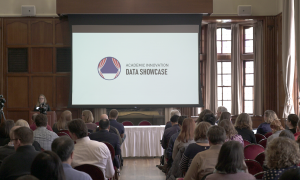 Gus Evrard, PhD, Arthur F. Thurnau Professor of Physics and Astronomy and Innovator-in-Residence at Academic Innovation, spoke about his work to make data accessible to stakeholders across the university, including the launch of ART 2.0 and the importance of establishing Problem Roulette to make exam preparation materials accessible. His talk highlighted the need for Academic Innovation, U-M Information and Technology Services (ITS), and the U-M schools and colleges to collaborate in building a better future. The past year has seen ART 2.0 rebranded into the Atlas platform, the release of new utilities in Atlas to support data-informed decision-making by administrators, and the establishment of a staff residency program between ITS Enterprise Application Services and the Center for Academic Innovation to grow the ability to build out this transformative platform. Dr. Evrard is on sabbatical this semester and using that time to travel the country and meet with like-minded colleagues at other institutions interested in furthering the data transparency and access. Talk about not just fulfilling the goals he established last year, but surpassing them!
Gus Evrard, PhD, Arthur F. Thurnau Professor of Physics and Astronomy and Innovator-in-Residence at Academic Innovation, spoke about his work to make data accessible to stakeholders across the university, including the launch of ART 2.0 and the importance of establishing Problem Roulette to make exam preparation materials accessible. His talk highlighted the need for Academic Innovation, U-M Information and Technology Services (ITS), and the U-M schools and colleges to collaborate in building a better future. The past year has seen ART 2.0 rebranded into the Atlas platform, the release of new utilities in Atlas to support data-informed decision-making by administrators, and the establishment of a staff residency program between ITS Enterprise Application Services and the Center for Academic Innovation to grow the ability to build out this transformative platform. Dr. Evrard is on sabbatical this semester and using that time to travel the country and meet with like-minded colleagues at other institutions interested in furthering the data transparency and access. Talk about not just fulfilling the goals he established last year, but surpassing them!
Ben Hayward, Associate Director for Software Development and User Experience Design, described the problem-solving philosophy that the Academic Innovation software team brings to building learning technologies. The past year has seen Academic Innovation establish foundational and future-proof data architecture and extending their commitment to interoperable applications, including building and expanding data integrations with Coursera, edX, and FutureLearn, and laying the foundational layer of the Online Learning Data Warehouse to capture cross-vendor data and power both operational and research needs.
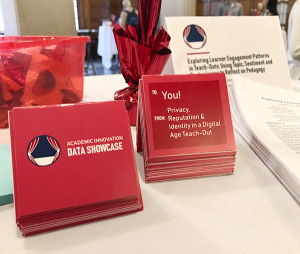 Dr. Rebecca Quintana, Center for Academic Innovation’s Learning Experience Design Lead, shared the process she and our colleagues on the learning experience design team have been using to create “Course Composition Diagrams” that depict structural curriculum choices to enable the team to reflect on the impact of the choices made across Academic Innovation’s Massive Open Online Course (MOOC) portfolio. Over the course of the past year, Dr. Quintana and our colleague Yuanru Tan, Learning Experience Designer and Accessibility Coordinator, have taken that work to new heights–considering how a single course design differs when implemented on multiple platforms, and how the components of courses yield different pedagogies. They’ll be joining us at this year’s Data Showcase to share more about this exciting work.
Dr. Rebecca Quintana, Center for Academic Innovation’s Learning Experience Design Lead, shared the process she and our colleagues on the learning experience design team have been using to create “Course Composition Diagrams” that depict structural curriculum choices to enable the team to reflect on the impact of the choices made across Academic Innovation’s Massive Open Online Course (MOOC) portfolio. Over the course of the past year, Dr. Quintana and our colleague Yuanru Tan, Learning Experience Designer and Accessibility Coordinator, have taken that work to new heights–considering how a single course design differs when implemented on multiple platforms, and how the components of courses yield different pedagogies. They’ll be joining us at this year’s Data Showcase to share more about this exciting work.
Dr. Meghan Duffy, Professor of Ecology and Evolutionary Biology in the College of Literature, Science, and the Arts, shared her data-focused lens on understanding student mental health at Michigan. In Fall 2019, Dr. Duffy established a Rackham Task Force on graduate student mental health and noted, “this is something that emerged out of the time I spent as a faculty Innovator-In-Residence in the Center for Academic Innovation…I would not have been able to do this work without their support.” We are grateful to Dr. Duffy for her leadership in this area, and looking forward to learning more about how we can support these efforts.
Sarah Dysart, Director of Online and Hybrid Programs, shared her vision for research that we were just getting started on, exploring how students in online degree programs make the decision to enroll, and what factors inform their decision making. As Sarah and her team have facilitated the launch of two online degrees in Fall 2019 with the School of Information and School of Public Health, we are eager to make sense of the data coming through regarding learner motivation and outcomes.
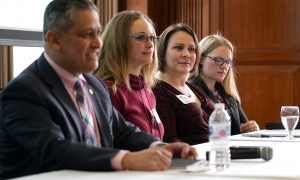 Finally, we had a stellar array of voices on our panel – Dr. Laura Alford, faculty in Naval Architecture and Marine Engineering, and Veronica Falandino, Associate Director for Admissions and Student Affairs, and Dr. Ravi Pendse, U-M’s Vice President for Information Technology and Chief Information Officer, joined me to discuss where we’re missing data in the educational landscape. The panel’s discussion around the degree to which we aren’t fully making use of data that’s already available to us and the importance of questioning how we use metrics to make decisions have been elements that I’ve reflected back on throughout the whole last year. With those questions in mind, this year we’ve invited a group of students to join us for a conversation about what role our own learners should play in this work–and I for one can’t wait to hear what they have to say.
Finally, we had a stellar array of voices on our panel – Dr. Laura Alford, faculty in Naval Architecture and Marine Engineering, and Veronica Falandino, Associate Director for Admissions and Student Affairs, and Dr. Ravi Pendse, U-M’s Vice President for Information Technology and Chief Information Officer, joined me to discuss where we’re missing data in the educational landscape. The panel’s discussion around the degree to which we aren’t fully making use of data that’s already available to us and the importance of questioning how we use metrics to make decisions have been elements that I’ve reflected back on throughout the whole last year. With those questions in mind, this year we’ve invited a group of students to join us for a conversation about what role our own learners should play in this work–and I for one can’t wait to hear what they have to say.
